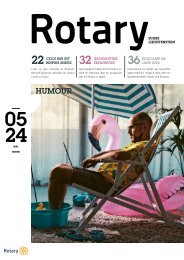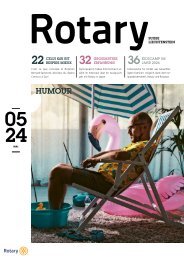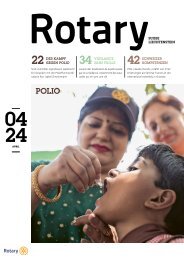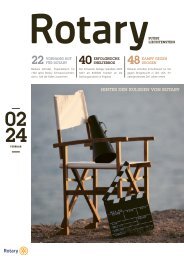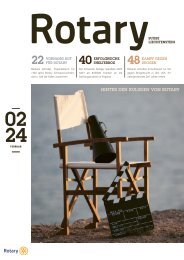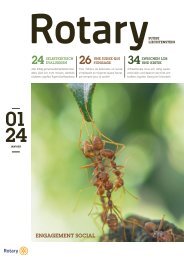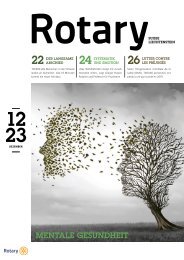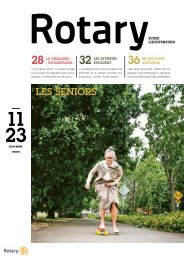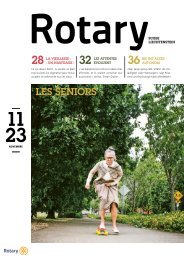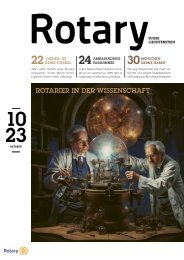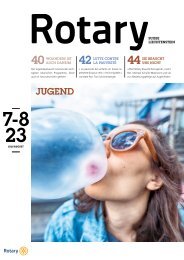Rotary Magazin 09/2023
You also want an ePaper? Increase the reach of your titles
YUMPU automatically turns print PDFs into web optimized ePapers that Google loves.
KANGAROO MO
ROTARY INTERNATIONAL – ROTARY SUISSE LIECHTENSTEIN – SEPTEMBRE 2023
FEATURE
THE PROMISE O
50
This low-tech method of skin-to-skin contact is improving
outcomes for premature babies and their mothers.
At birth, a baby kangaroo climbs into its
mother’s pouch, latches onto a nipple, and
stays put until it is more fully developed.
Now imagine if you could do something
similar for a human baby who is born prematurely.
That’s the concept behind a lowtech
intervention known as kangaroo
mother care.
«Kangaroo mother care involves skinto-skin
care with the mother or with
another family member: The father, grandmother,
aunts and uncles, and brothers and
sisters have all done it», says Doug Mc -
Millan, a member of the Rotary Club of
Calgary, Alberta, and a neonatologist
experienced in global child health. Mothers
get support to breastfeed exclusively, and
if someone else is helping with the kangaroo
care, the baby is fed stored breastmilk.
The method was developed more than
four decades ago in Colombia, when physician
researchers Edgar Rey Sanabria and
Héctor Martínez-Gómez were looking for
a way to keep babies warm and with their
mothers because their hospital didn’t have
incubators for low birthweight newborns.
The death rate for low birthweight infants
at their hospital was 70 percent at the time.
Since then, multiple studies have
shown kangaroo mother care saves newborn
lives: It maintains better temperature,
improves nutrition and growth, decreases
infection, and enhances the bonding
between the mother and the baby, explains
McMillan, a member of The Rotary Foundation
Cadre of Technical Advisers. It has
benefits for mothers too, reducing postpartum
depression and enhancing their
perceived ability to care for their newborns.
But while child mortality has otherwise
declined dramatically, 1.6 million premature
or low birthweight babies die every
year in their first month, according to the
Bill & Melinda Gates Foundation. More
than 75 percent of deaths of premature
babies are preventable using current
knowledge and basic clinical care.
In Uganda, the neonatal mortality rate
is about 19 per 1000 live births. In recent
years at Mbarara Regional Referral Hospital,
southwest of the capital of Kampala,
about 200 babies admitted to the neonatal
unit died each year. About 70 percent were
preterm. The two major causes of death
were hypothermia, as infants born early are
often too small to keep themselves warm,
and infections – two conditions complicated
by malnutrition.
That’s where Rotarians stepped in. The
Rotary clubs of Mbarara, Uganda, and
Calgary at Stampede Park, Alberta, applied
for a Rotary Foundation global grant to
upgrade the kangaroo care program at the
hospital. Through the project, which began
in late 2020, more than 40 nurses, midwives,
pediatricians, and other doctors
have been trained in kangaroo care. The
project has also supported the development
of a curriculum for health care workers
to use to teach mothers how to do
kangaroo care. The curriculum has been
translated into the local language and
printed, and mothers are now able to train
other mothers on the method.
Women tailors made 500 kangaroo
mother care wraps as part of the project,
generating income in the area. «The wraps
are easier to use and better accepted than
the kangas, or pieces of cloth, mothers may
have used earlier to carry around their
babies», says McMillan, who has been volunteering
in Mbarara for over 20 years.
Meanwhile, Rotarians were able to secure
meals for mothers who needed food,
which has improved breastfeeding and
reduced the rate of women leaving hospital
care early.
In addition, the grant helped fund
improvements in the newborn unit. Before
the grant, in January 2020, the unit had just
one thermometer and lacked other equipment.
At least two babies would share a
cot, often with a torn mattress, increasing
the risk of spreading infections. «The newborn
unit now has the equipment to treat
sick babies, more bed space, and chairs to
sit on», explains Sheila Abaasa, past president
of the Rotary Club of Mbarara.
Rotary members in Brazil, in partnership
with members in India, are also supporting
the practice through a global grant.
Their grant targeted a hospital along the
southern border with Paraguay and Argentina,
a densely populated area with a high
poverty rate. The Hospital Ministro Costa
Cavalcanti is noted for its care for children,
says Alexandre Kraemer of the Rotary Club
of Foz do Iguaçú-Grande Lago. The hospital
serves high-risk pregnant women in the
city and the region, as well as Brazilians
who live in neighboring countries, mainly
in Paraguay. It also handles obstetric emergencies.
The grant helped purchase equipment
including slings and armchairs made especially
for breastfeeding. The slings are made
with special fabric designed to help «the
mother to welcome the baby in her lap as
kangaroos do, to convey the mother’s
heartbeat to the baby, their body heat and



